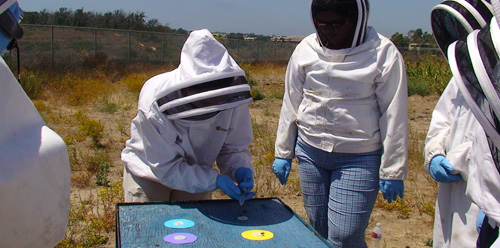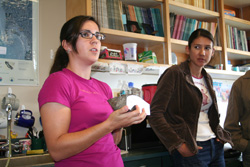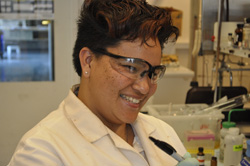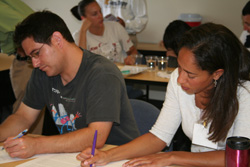Bees, Biology and Chemistry: Bringing Graduate Level Research to High School Classrooms
June 7, 2010
By Maarten Chrispeels

Socrates Fellow Meg Eckles training students not to be afraid of bees and how to work with them.
Credit: Glenn Lee
Paula Ezcurra, a senior at Helix Charter High School in La Mesa, is sitting in the hot noonday sun staring intently at a potted plant in full bloom. She is waiting for a honeybee or other flying insect to arrive. Will it set down and suck up the sweet nectar or will it just hover and depart again looking for a different flower?
More than a dozen of her classmates are involved in the same activity. They are trying to find out if pollinators prefer introduced plants like the Indian Hawthorn over native plants like the Monkey Flower.
Megan Eckles, an ecology doctoral student in UC San Diego's Division of Biological Sciences, is the leader of this small research project. She is a fellow in UCSD's Socrates program, which provides fellowships to UCSD graduate students to work with local teachers to teach students about scientific discovery and motivate them to pursue scientific careers.

Socrates Fellow Johnnie Lyman with high school students in her laboratory at UC San Diego's Scripps Institution of Oceanography.
Credit: James Short
Eckles teamed up with Jeff Kepper, a 16-year veteran biology teacher at Helix Charter High and with Debbie Byrd, the school's AP environmental science teacher. Eckles and nine other Socrates fellows, all doctoral students, are enriching the high school science curriculum of various San Diego area schools with cutting edge science from UCSD. The fellowships are funded through a science education grant from the National Science Foundation.
Kepper, the Helix Charter teacher, is unequivocal in his support for the Socrates program. "Having a doctoral candidate in the classroom is fantastic," he says. "My students have really responded, and I believe for some it has strengthened their resolve to become scientists."
Eckles' research with James Nieh, a biology professor at UCSD, is on honeybee behavior. One of her goals as a Socrates fellow is to use bees-and the important role they play in local ecology and pollination-to teach students about the scientific method by demonstrating the different stages of forming and testing hypotheses.
"Bees are keystone environmental species and have proven to be a productive model for studying the evolution of behavior, cognition, and sociality," she says. "They are also important and active pollinators on plants in the San Diego environment, and wild populations of bees lend themselves well to a study on pollination ecology."
Eckles teaches her students not only the principles of ecology, but also how to collect data and the importance of having good controls if you want to draw a valid conclusion. The conclusion from their studies so far is that by about 5 to 1, honeybees prefer introduced plants over natives. Since introduced plants rather than native plants abound in our gardens, honeybees find plenty of food and, as honeybee populations increase, they may outcompete other pollinators that prefer native plants, endangering the survival of our native plants.

Socrates Fellow Kristina Pohaku Mitchell in her chemistry laboratory at UCSD.
Credit: James Short
Josh Kohn, a biology professor who also chairs the Section of Evolution, Behavior and Ecology at UCSD, believes that it is important for high school students to understand that not all science is done in laboratories. While answering some important questions requires sophisticated instrumentation, answering other questions that are equally relevant may simply require patient observation of our natural ecosystems. Students who prefer the outdoors may be attracted to training for such careers. Eckles' research takes her to Panama every year for several months. She says she loves helping students understand the chaparral ecosystem that surrounds us in San Diego County.
While discussing UCSD's efforts to improve scientific literacy on KPBS radio's "These Days" program, Chancellor Marye Anne Fox recently referred to the Socrates program and its emphasis on bringing to the students the excitement of scientific discovery as a way of motivating them to enter science careers.
There is little doubt that the program also helps to propel the Socrates fellows themselves. Although it takes away some time from research, it gives them additional skills and advantages when competing for scarce jobs in the academic marketplace. Socrates program coordinator Shelley Glenn Lee, who has a graduate degree in science education from San Diego State University, coaches the Socrates Fellows in pedagogy and helps them hone their presentations skills.
"No other program on the UCSD campus is providing Ph.D. students with the opportunities for professional development in science communication that the Socrates program offers," she says. "These science doctoral students are truly fortunate to have been selected. They will see the benefits for the rest of their lives."

Socrates Fellow Andro Rios and Hilltop High School biology teacher Jessica McSwain at the Summer Institute where Fellows learn classroom pedagogy and strategies.
Credit: James Short
Fellows are charged with bring cutting-edge science into the classrooms, especially those classrooms with many underserved students. Andro Rios, a chemistry doctoral student at UCSD and a Socrates fellow, who is teamed with teacher Gerry French at Montgomery High School, says "working with these young people is amazing. If you demonstrate a genuine care for the students, and share your own experiences and enthusiasm for science, most of them will readily join you on the path of scientific inquiry."
Adds another UCSD Socrates fellow and doctoral student in chemistry, Kristina Pohaku Mitchell: "I had to deepen my understanding of my own research to effectively communicate it to a less scientifically literate audience."
More information on the 2010-2011 Socrates Fellows
Maarten Chrispeels is a professor of biology at UCSD and principal investigator of the NSF grant for Graduate STEM Fellows in K12 Education to UCSD that funds the Socrates
Related Links
- 2010-2011 Socrates Fellows
